苏教版六年级英语(上)6AUnit6第六单元短语、词汇、知识点梳理知识汇总知识归纳总结资料
上海6年级第一学期英语6A知识点Unit 6整理
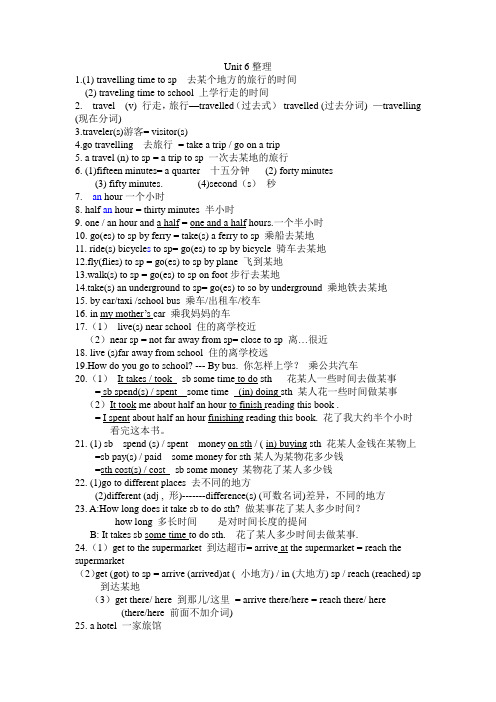
Unit 6整理1.(1) travelling time to sp 去某个地方的旅行的时间(2) traveling time to school 上学行走的时间2. travel (v) 行走,旅行—travelled(过去式)travelled (过去分词) —travelling (现在分词)3.traveler(s)游客= visitor(s)4.go travelling 去旅行= take a trip / go on a trip5. a travel (n) to sp = a trip to sp 一次去某地的旅行6. (1)fifteen minutes= a quarter 十五分钟(2) forty minutes(3) fifty minutes. (4)second(s)秒7. an hour一个小时8. half an hour = thirty minutes 半小时9. one / an hour and a half = one and a half hours.一个半小时10. go(es) to sp by ferry = take(s) a ferry to sp 乘船去某地11. ride(s) bicycle s to sp= go(es) to sp by bicycle 骑车去某地12.fly(flies) to sp = go(es) to sp by plane 飞到某地13.walk(s) to sp = go(es) to sp on foot步行去某地14.take(s) an underground to sp= go(es) to so by underground 乘地铁去某地15. by car/taxi /school bus 乘车/出租车/校车16. in my mother’s car 乘我妈妈的车17.(1)live(s) near school 住的离学校近(2)near sp = not far away from sp= close to sp 离…很近18. live (s)far away from school 住的离学校远19.How do you go to school? --- By bus. 你怎样上学?乘公共汽车20.(1)It takes / took sb some time to do sth 花某人一些时间去做某事= sb spend(s) / spent some time (in) doing sth 某人花一些时间做某事(2)It took me about half an hour to finish reading this book .= I spent about half an hour finishing reading this book. 花了我大约半个小时看完这本书。
苏教版最新译林版六年级上册6A英语知识点总结(K12教育文档)
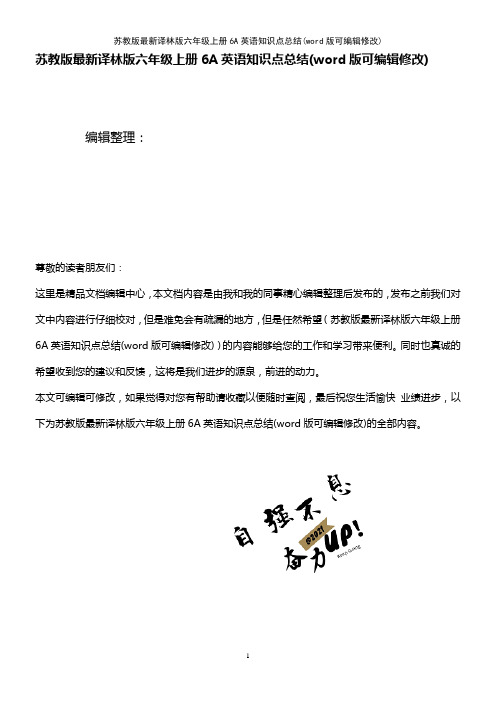
苏教版最新译林版六年级上册6A英语知识点总结(word版可编辑修改) 编辑整理:
尊敬的读者朋友们:
这里是精品文档编辑中心,本文档内容是由我和我的同事精心编辑整理后发布的,发布之前我们对文中内容进行仔细校对,但是难免会有疏漏的地方,但是任然希望(苏教版最新译林版六年级上册6A英语知识点总结(word版可编辑修改))的内容能够给您的工作和学习带来便利。
同时也真诚的希望收到您的建议和反馈,这将是我们进步的源泉,前进的动力。
本文可编辑可修改,如果觉得对您有帮助请收藏以便随时查阅,最后祝您生活愉快业绩进步,以下为苏教版最新译林版六年级上册6A英语知识点总结(word版可编辑修改)的全部内容。
六上英语第六单元知识点
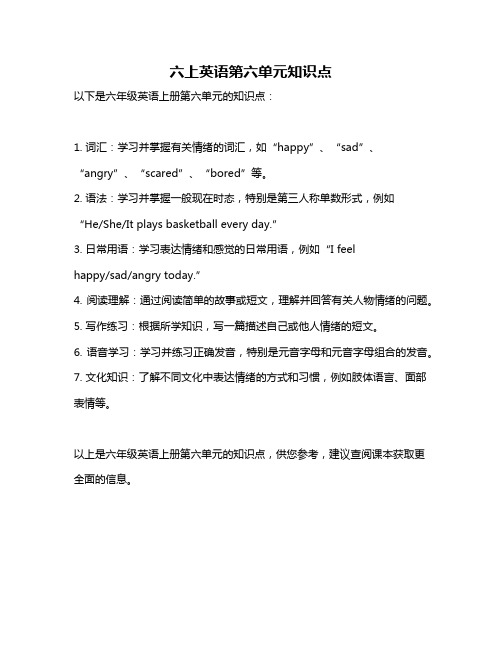
六上英语第六单元知识点
以下是六年级英语上册第六单元的知识点:
1. 词汇:学习并掌握有关情绪的词汇,如“happy”、“sad”、“angry”、“scared”、“bored”等。
2. 语法:学习并掌握一般现在时态,特别是第三人称单数形式,例如
“He/She/It plays basketball every day.”
3. 日常用语:学习表达情绪和感觉的日常用语,例如“I feel
happy/sad/angry today.”
4. 阅读理解:通过阅读简单的故事或短文,理解并回答有关人物情绪的问题。
5. 写作练习:根据所学知识,写一篇描述自己或他人情绪的短文。
6. 语音学习:学习并练习正确发音,特别是元音字母和元音字母组合的发音。
7. 文化知识:了解不同文化中表达情绪的方式和习惯,例如肢体语言、面部表情等。
以上是六年级英语上册第六单元的知识点,供您参考,建议查阅课本获取更全面的信息。
英语六年级上册六单元知识点总结
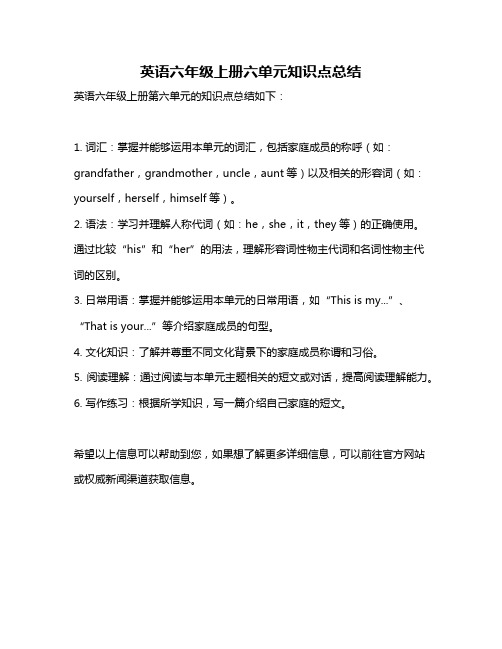
英语六年级上册六单元知识点总结
英语六年级上册第六单元的知识点总结如下:
1. 词汇:掌握并能够运用本单元的词汇,包括家庭成员的称呼(如:grandfather,grandmother,uncle,aunt等)以及相关的形容词(如:yourself,herself,himself等)。
2. 语法:学习并理解人称代词(如:he,she,it,they等)的正确使用。
通过比较“his”和“her”的用法,理解形容词性物主代词和名词性物主代词的区别。
3. 日常用语:掌握并能够运用本单元的日常用语,如“This is my...”、“That is your...”等介绍家庭成员的句型。
4. 文化知识:了解并尊重不同文化背景下的家庭成员称谓和习俗。
5. 阅读理解:通过阅读与本单元主题相关的短文或对话,提高阅读理解能力。
6. 写作练习:根据所学知识,写一篇介绍自己家庭的短文。
希望以上信息可以帮助到您,如果想了解更多详细信息,可以前往官方网站或权威新闻渠道获取信息。
小学六年级的上册的英语第六单元总结复习学习知识点.doc
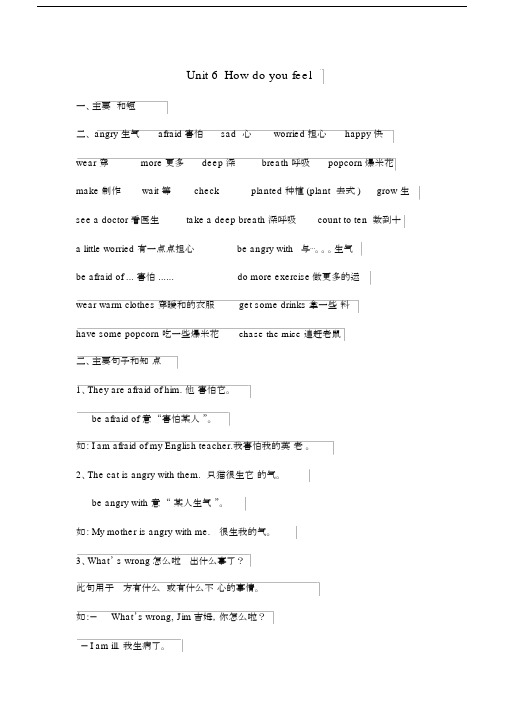
Unit 6 How do you feel一、主要和短二、 angry 生气afraid 害怕sad 心worried 担心happy 快wear 穿more 更多deep 深breath 呼吸popcorn 爆米花make 制作wait 等check planted 种植 (plant 去式 ) grow 生see a doctor 看医生take a deep breath 深呼吸count to ten 数到十a little worried 有一点点担心be angry with与⋯。
生气be afraid of ... 害怕 ......do more exercise做更多的运wear warm clothes 穿暖和的衣服get some drinks 拿一些料have some popcorn 吃一些爆米花chase the mice 追赶老鼠二、主要句子和知点1、They are afraid of him. 他害怕它。
be afraid of 意“害怕某人”。
如: I am afraid of my English teacher.我害怕我的英老。
2、The cat is angry with them. 只猫很生它的气。
be angry with 意“ 某人生气”。
如: My mother is angry with me. 很生我的气。
3、What’ s wrong怎么啦出什么事了?此句用于方有什么或有什么不心的事情。
如:—What’s wrong, Jim吉姆,你怎么啦?— I am ill. 我生病了。
4、Your father is ill. 你爸爸生病了。
5、5、He should see a doctor this morning. 他今天早上应该去看病。
6、should 为情态动词,表示“应该,应当”。
此句用来给别人提建议。
如: He should work harder. 他应该更加努力。
- 1、下载文档前请自行甄别文档内容的完整性,平台不提供额外的编辑、内容补充、找答案等附加服务。
- 2、"仅部分预览"的文档,不可在线预览部分如存在完整性等问题,可反馈申请退款(可完整预览的文档不适用该条件!)。
- 3、如文档侵犯您的权益,请联系客服反馈,我们会尽快为您处理(人工客服工作时间:9:00-18:30)。
6AUnit 6 Keep our city clean 单元知识归纳
短语积累
1.keep our city clean 保持我们的城市干净 2. these pictures of our city这些我们城市的图片 3. smoke from cars汽车的尾气 4.make the air dirty使空气变脏 5.black smoke from factories工厂里的黑烟 6.messy and dirty又乱又脏 7. take the metro to school=go to school by metro 乘地铁上学 8.dead fish 死鱼 9. walk to school=go to school on foot 步行上学 10. move some factories away把工厂搬走 11. put rubbish in the bin把垃圾放进垃圾桶 12.plant more trees种植更多的树 13.help keep the air clean(help后的动词省略to) 有助于净化空气 14.your ideas你们的主意 15.well done干得好 17 sweep the floor 扫地 18.by the river在小河边 19.throw rubbish扔垃圾
20. on the floor 在地上
21..walk home=go home on foot步行回家
22.after school放学后
23.like living in the city喜欢住在城市
24. many museums 许多博物馆
25. throw a banana skin on the ground
把香蕉皮扔在地上
26. slip on the banana skin滑倒在香蕉皮上
27. go to the hospital去医院看病
see the doctor看医生
28. pick it up把它捡起
pick them up(把他们捡起)
29. in the water在水里
30. clean and beautiful又干净又漂亮
31. do that那样做
32. too late 太迟了
33. go to hospital 去医院(看病)
重点句子
1. What makes the air dirty? 什么使空气变脏? Smoke makes the air dirty.烟雾使空气变脏。
2. What makes the streets messy and dirty? 什么使街道变得又乱又脏?
Rubbish makes the streets messy and dirty. 垃圾使街道变得又乱又脏。
3. What can we do to keep our city clean? 保持我们的城市整洁,我们可以做什么?
We can take the bus and the metro to school. 我们可以乘公共车和地铁上学。
We can walk to school. 我们可以走路上学。
We can move some factories away from our city. 我们可以把一些工厂搬离我们的城市。
We can put rubbish in the bin. 我们可以把垃圾放进垃圾桶。
We can plant more trees. 我们种更多的树。
4. Is the city clean? 城市干净吗? 5. Is the river dirty? 河脏吗? 6. The fish are dead. 鱼死了。
7. There’s rubbish in the water. 水里有垃圾。
8. They help keep the air clean. 它们有助于保持空气洁净。
9. I like living in the city. 我喜欢住在城里。
10. There are many museums, shops and cinemas. 有许多博物馆、商店和电影院。
11. Bobby throws a banana skin on the ground. 鲍比把一块香蕉皮扔在地上。
12. Bobby, you shouldn’t do that. 鲍比,你不应该那样做。
13. Billy slips on the banana skin and falls. 比利在香蕉皮上滑到并摔倒了。
14. You should put your rubbish in the bin. 你应该把垃圾放进垃圾桶。
15. The bedroom is messy. 卧室很乱。
16. The clothes make the bed messy. 衣服使床乱了。
17. The toys make the floor messy. 玩具使地面乱了。
五、语法
1. Keep our city clean 保持城市清洁。(keep + sth +形容词)
Keep +复合宾语(宾语+宾语补足语)表示“保持某人或某物的某种状态”。本句中的宾语补足语是形容词。又如:
Please keep your clothes clean.请保持衣服干净。
Put on this pair of gloves. They will keep your hands warm.把手套戴上。手套可以保暖。
2. What makes our city dirty? 什么让我们的城市变脏了?(make + sb/sth+ 形容词)
Make+复合宾语(名词或代词+形容词)表示“使……变得……”。如:
Rubbish makes the streets messy and dirty.垃圾使街道变得又脏又乱。
Fruit can make us healthy and strong.水果可以使我们健康强壮。
注意:make前是特殊疑问词what, who, which等作主语时,这些疑问词相当于第三人称单数,所以一般现在时
谓语动词make加s。
3. What can we do to keep our city clean?为保持我们的城市清洁,我们可以做些什么呢?
此句中的to keep our city clean 是不定式短语,作状语,用以说明what can we do 的目的。又如:
Tina’s friends come to see her.蒂娜的朋友来看她。
4. We can move some factories away from our city. 我们可以把一些工厂从城市搬走。
Move…away是“搬走”、“移走”的意思。 如:
Please move your car away. 请把你的车开走。
5. They help keep the air clean. 它们(树)有助于保持空气洁净。
此句中的keep the air clean也是动词不定式,作help的宾语。接在help 后的动词不定式,通常省略to,尤其在
非正式用语和口语中。如:
Can you help (to)open the window?你能帮忙打开窗子吗?
Let me help (to) sweep the floor. 让我来帮忙扫地吧。
6. I like living in the city. 我喜欢住在城市里。
在这里的living 是like 的宾语。 Like接动名词形式作其宾语,意思是“喜爱……”,通常指经常性的喜爱。如:
I like swimming. 我喜欢游泳。
7. Pick it up. 把它捡起来。
Pick up 是个由动词加副词构成的短语动词。 在这类动词中,如果有宾语,可以将宾语放在副词前面,也可以将
宾语放在副词后面。如:
把香蕉皮捡起来。
Pick up the banana skin.
Pick the banana skin up.
把外衣穿上。
Put on the coat.
Put the coat on.
但如果宾语是人称代词,就必须将它放在这副词前面。 如:
Pick it up.
Put it on.
8. Billy goes to hospital. 比利去医院看病。
表示“去医院看病”时,英国英语是go to hospital, 而美国英语则是go to the hospital。 如:
你应该去医院看病。
You should go to hospital.(英国英语) You should go to the hospital. (美国英语)
